A private network connection & the cloud: the perfect match for your company

Companies switching to the cloud are often somewhat sceptical: how can a remote server remain available at all times? The answer is simple: with optimal private connectivity.
The importance of good connectivity
Every company wants to be able to access its data at any time of the day. And that makes perfect sense, because imagine what would happen if you were suddenly unable to do your work because 'the Internet' just went down!
With a good connection (connectivity), you can be sure that your company is always properly connected to your cloud, but also to your staff and even to other branches of your company. This way, no one will get frustrated during a stuttering Zoom meeting, and you will be able to work easily and smoothly in the cloud.
A stable and fast connection is essential for a good company network. Such a company network is a private network in which all your devices (computers, printers, servers, etc.) are connected to each other and to the Internet.
In that company network, the only people who can access your data are those working for your company, and your business processes are fully protected.
Your company network – and the connection to the data centre where your cloud infrastructure is located – starts with a cable. This can be a shared Internet connection, but a much better option is to have your own private connection.
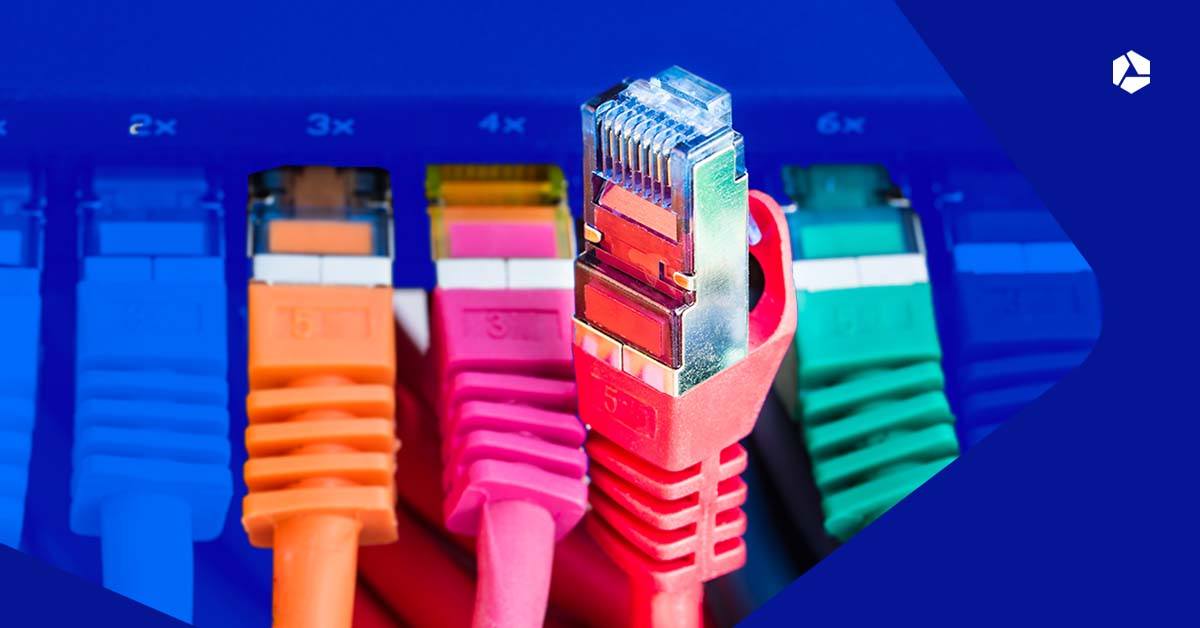
A shared Internet connection: not the safest option
It is perfectly possible to set up your company network and cloud connection via an ordinary Internet connection, i.e. a connection that runs via a cable in your street, allowing several households or companies to connect to the Internet.
Our country is (almost) entirely cabled by Internet providers that usually guarantee high Internet speeds, and even the much faster optical fiber is becoming more widely available.
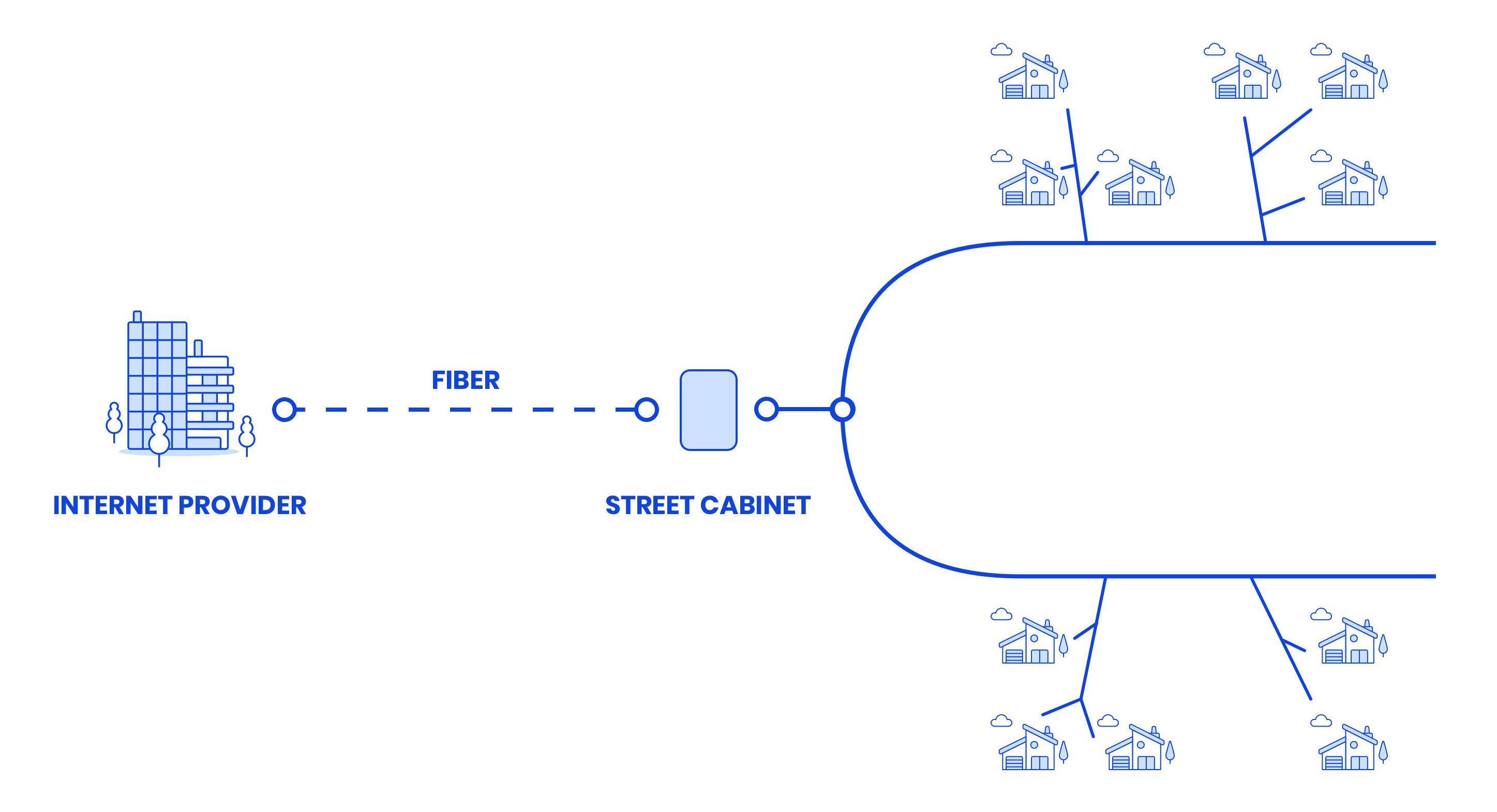
Using the public Internet for your cloud connection is the cheapest option, but we must warn companies that it is not the safest.
One of the most significant disadvantages of such a shared connection is that you are dependent on the speed offered by your Internet provider. When it offers slower Internet (for whatever reason) or when something breaks down, you are left to your fate.
Uploading data, in particular, is often a pain point when using a shared Internet connection. Uploading means that you are going to send files from your own computer to a recipient (storing files on your server, sending an e-mail, streaming, etc.). And speed is obviously of great importance in this process.
Internet as a highway
You can compare the public Internet to a highway: everyone who needs it uses it, but it can also cause traffic jams. When there is a traffic jam on the way, you are redirected via another (longer) route.
The longer the road, the more unsafe, too. On a highway, you might pass more dangerous points, and the same is true on the Internet. You never know where vulnerabilities lie in the public Internet. Because your data are worth their weight in gold, and hackers are well aware of this too.
Fortunately, the security of a lot of Internet traffic is already guaranteed by websites that use SSL certificates (with a padlock icon in your address bar and the URL of such a website starting with https). However, a lot of Internet traffic is not necessarily properly secured.
If you store your data locally and you only work in one location, you can consider using a shared Internet connection – as long as you make sure that your local network is adequately protected!
However, we do not recommend that you store all your data locally: external backups are a must for every company. And for that, you obviously need a secure and reliable connection.
So if you store your data externally, or have several branches you want to connect to, we would strongly advise against a public Internet connection. Because there are other affordable options out there!
Setting up a private connection
A private connection to your cloud is very simple to explain: you send your data via a 'private cable' to a server in a data centre. And when you need that data, it is sent back to you via the same cable. Clear as day!
Important
With a private connection, redundancy is important for your connectivity.
This means that your connection is split into two identical 'cables' running from A to B. These cables are completely separate from each other, and run via different routes.
In the event that one of these two connections fails, people will still be able to reach you via the other 'cable'.
VPN
We already warned you about the dangers of a public Internet connection, but there are ways to avoid those dangers. One of them is using a VPN (Virtual Private Network). Such a VPN is virtual, which means it does not use its own cables.
A VPN encrypts a connection, thanks to software installed on the users' computers. This allows you to send and receive data over the Internet, but the data are only available to people who have access to the private network.
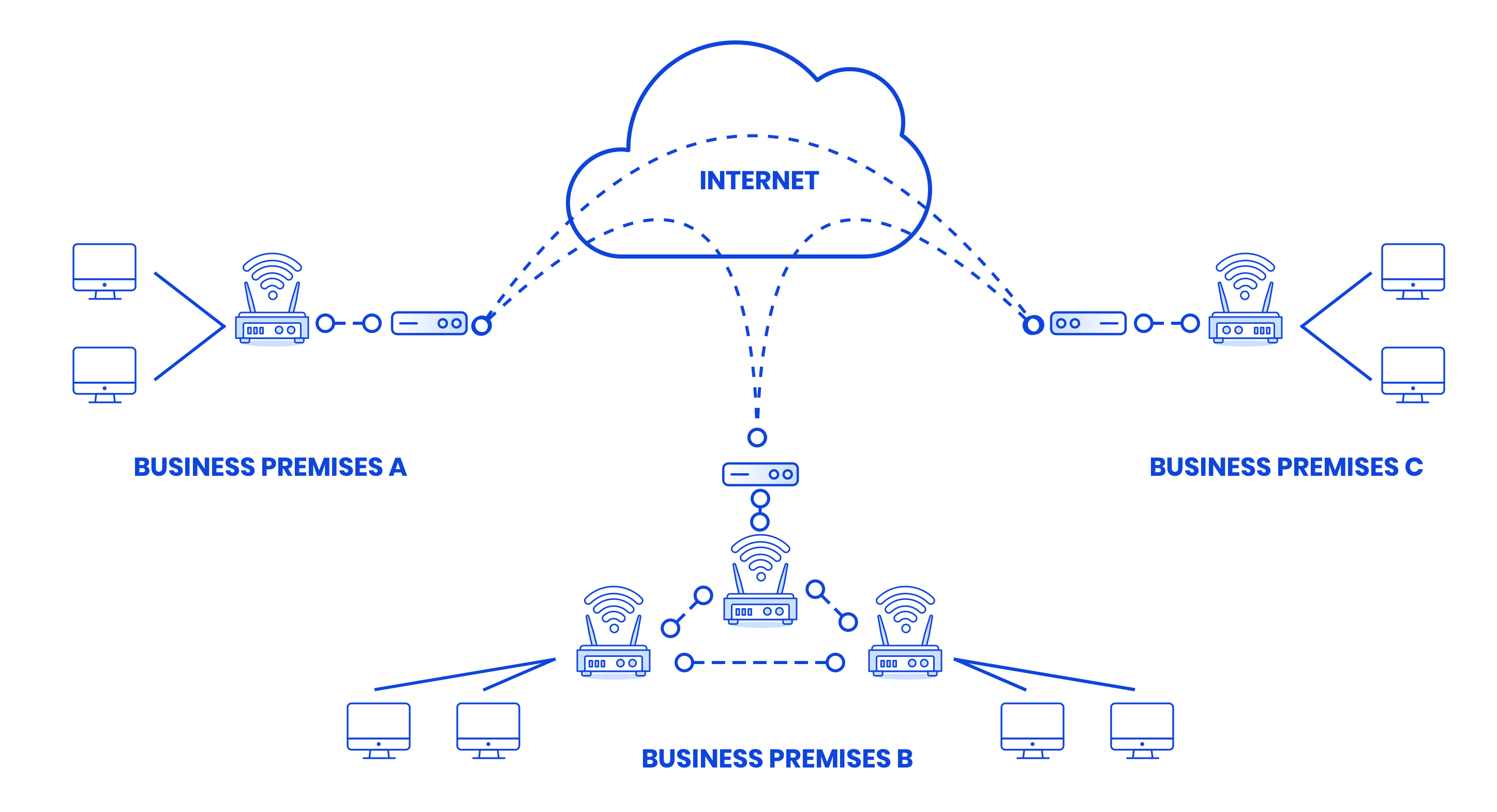
VPN is also referred to as a 'tunnel in the public Internet'. This tunnel ensures that all your data travel through the shared Internet cable while being protected, so that no one can look into the tunnel.
Protecting your data and activities on the Internet from prying eyes.
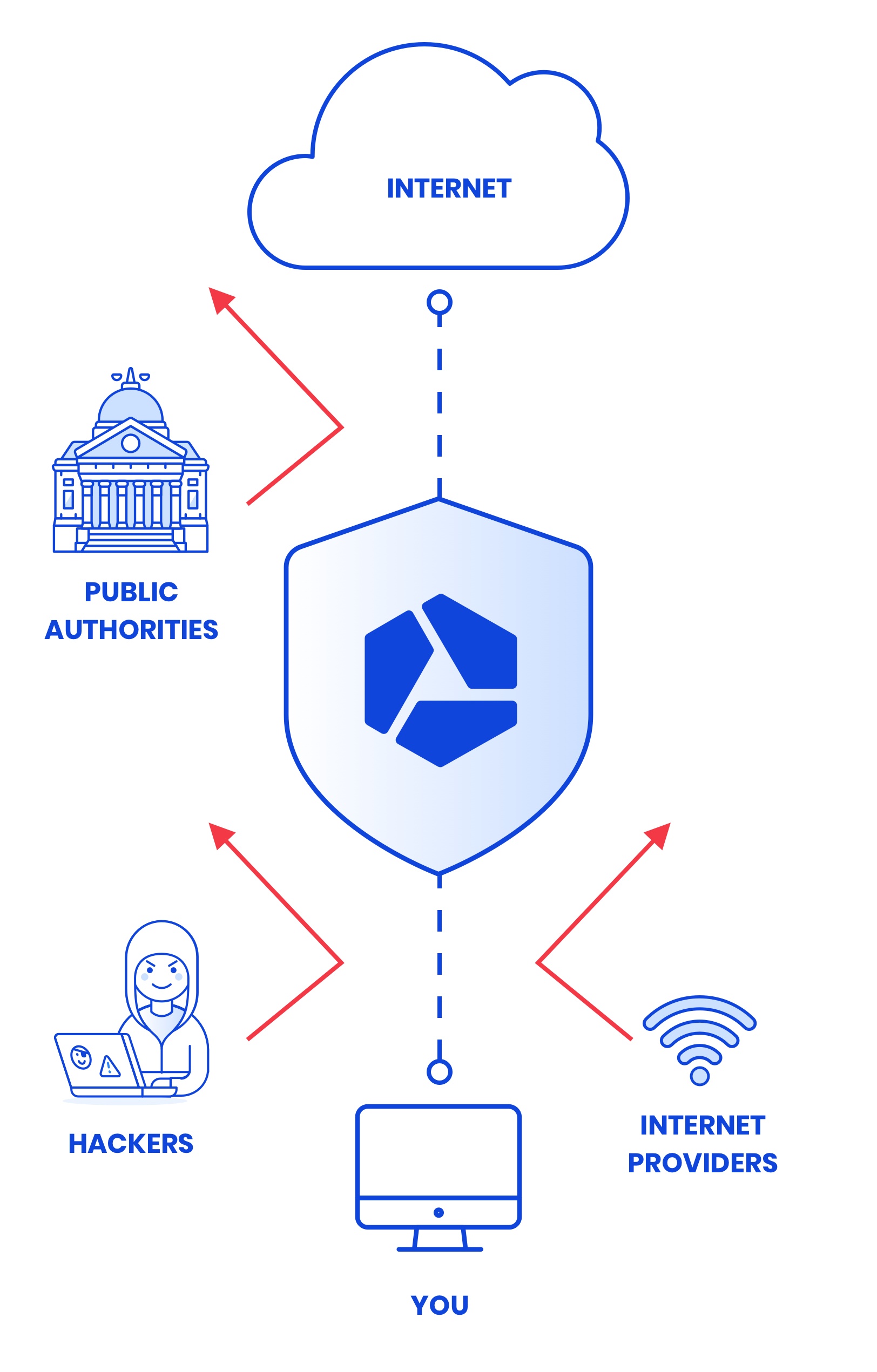
This makes a VPN quite secure, but it is also extremely useful for teleworking: it allows your employees to work from home with data stored in the cloud, or to log in to your local intranet. In other words, a VPN allows you to connect to your office or your data anytime, anywhere, from any corner of the world.
The disadvantage of a VPN is that your systems are still vulnerable to various attacks, including DDoS attacks, plus your speed and bandwidth are dependent on your Internet connection.
Encryption
Encryption is a practice that makes it possible to encode your data. A typical example is the https in the URL of a web page. Web pages that use https are secured by SSL (Secure Sockets Layer).
The 's' in https stands for secure. This means that the data you enter on that page are sent encrypted to the owner of the website. This is very important, especially if you need to enter payment or personal information in a form.
A VPN is particularly useful when you want to send unencrypted data (i.e. data that are not sent via a website protected by SSL).
E-mails, for example, are not encrypted by default. A VPN is therefore important for e-mails (just as it is for sending data via many other channels!)
MPLS
Another form of virtual network is MPLS (Multiprotocol Label Switching). With this, you use the cables and infrastructure of an Internet Service Provider (the 'MPLS backbone') to create your own virtual network, which only your staff can use.
MPLS is more expensive than VPN, but it does provide higher bandwidths and faster connections: by labelling your data, it ensures that your data are always sent via the most efficient route.
The key advantage of MPLS is that your data are not transmitted over a shared Internet network. This means that you are not dependent on the speeds offered by an Internet provider, and also that your data are more secure.
Dark Fiber
You can also choose to use (part of) a private physical cable for your company network. This will help you to completely isolate your network from other networks, which is of course even more secure than having a virtual network (that shares a cable with other networks).
As mentioned above, our country is already fairly well equipped with cables, and these include unused fiber-optic cables. So if you want to set up a company network with its own cable, you can do so with Dark Fiber.
Dark fiber is a fiber-optic cable that has not yet been used, and therefore no light has ever passed through it – hence the name 'dark fiber' (dark as in unlit). It connects your branch offices to each other and to the data centres of your cloud infrastructure.
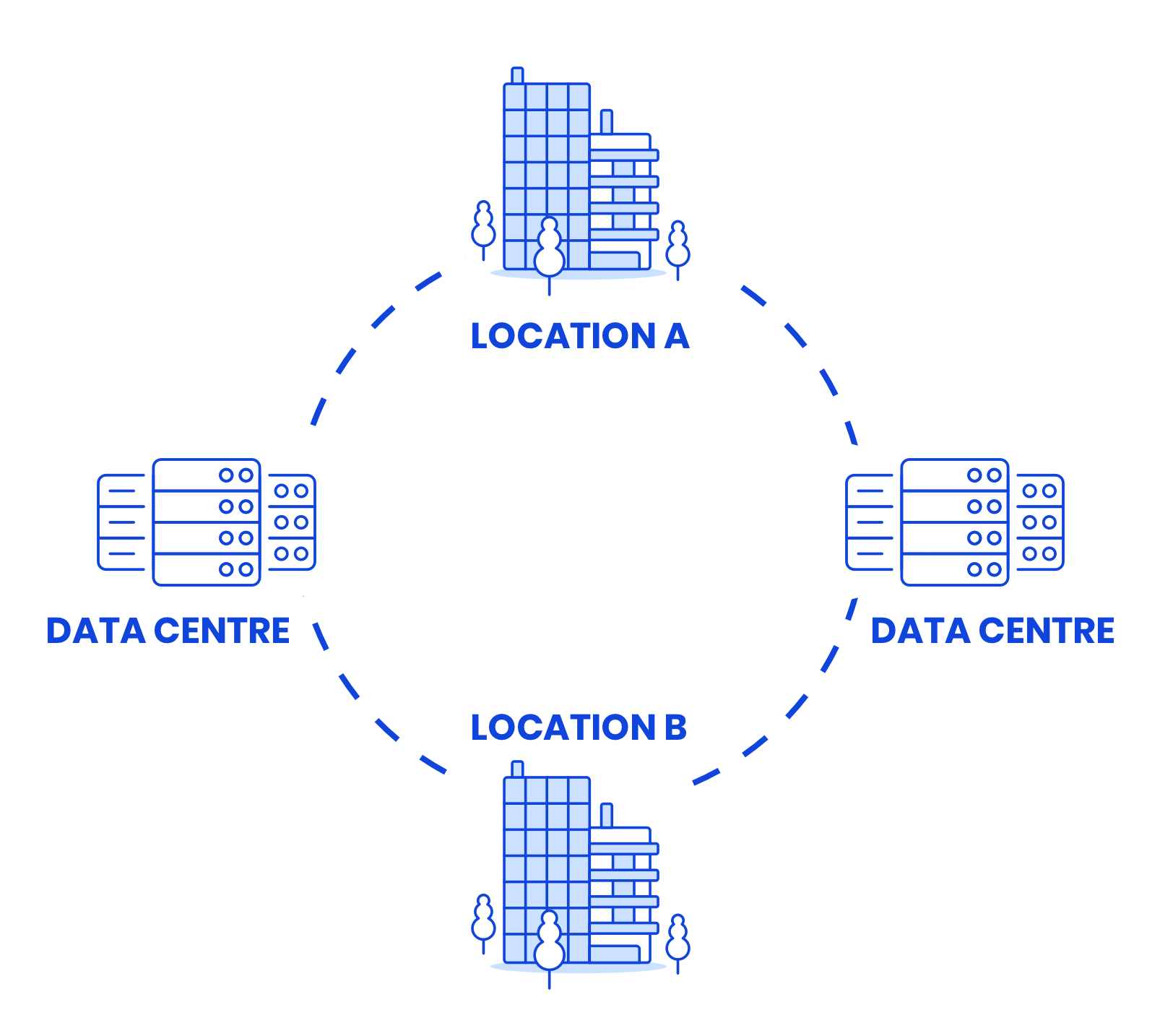
If you decide to use Dark Fiber, you can turn to an Internet service provider such as Combell, which will check whether there are already fiber-optic connections available in your neighbourhood, or whether there are any that still need to be installed.
Dark Fiber is the best choice when your company needs to be available at all times (in other words, when your connection is business-critical). Your Dark Fiber connection provides unprecedented bandwidth, meaning you can send a lot of data over a short period of time. Moreover, it is highly scalable.
You can thus easily scale up your connection as your business expands, allowing you to send even more data over the same cable.
Wavelength Division Multiplexing
If you do not need your own fiber-optic cable, you can also opt for WDM (Wavelength Division Multiplexing).
Simply put, a fiber-optic cable carries different light frequencies. With WDM, you will use one (or more) of those light frequencies exclusively, so that you have your own part of a shared fiber-optic cable.
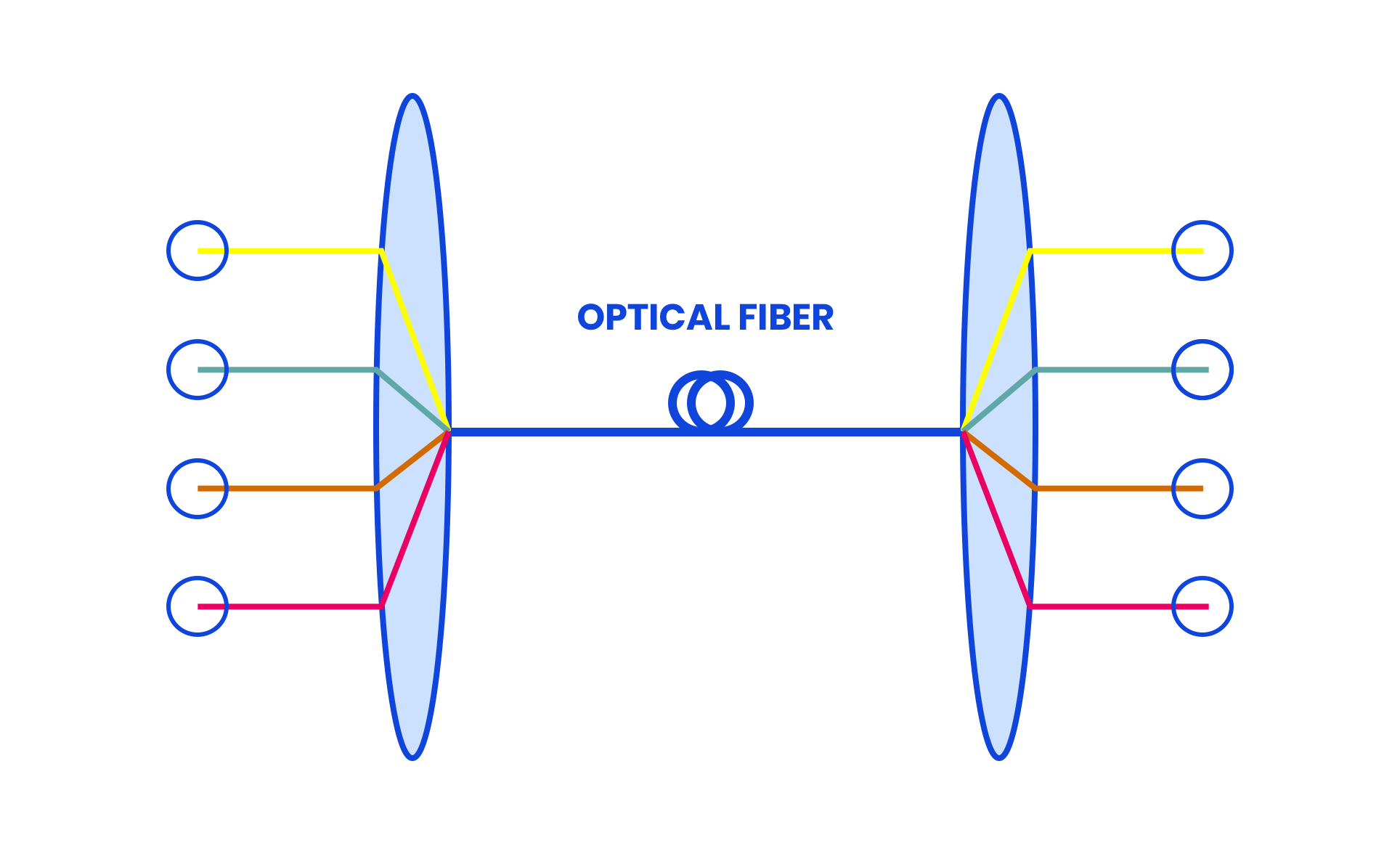
This makes WDM very safe: it is isolated from other networks on the same cable, but can guarantee the same speeds as your own exclusive fiber-optic cable.
Who needs a company network?
Companies moving to the cloud need a stable connection to that cloud, but the increasingly common practice of teleworking also requires a company network.
In a nutshell: when your company needs a stable and secure connection to other branches, data centres or collaborators, you should have your own company network.
How can Combell help you with your connection?
Combell is proud of all the ways in which we can facilitate your company network. Thanks to our 'network-agnostic' data centre, we do not depend on one particular Internet service provider, which allows us to work with the 'cable provider' that best meets your company's needs.
Getting your connection started is easy:
- Get in touch with Combell.
- Together with you, we will look for the best possible form of connectivity for your business.
- We will look for the best infrastructure (cables and hardware) to achieve this.
- If necessary, we will ensure that the infrastructure is installed all the way to your office.
- Thanks to Combell, you will be connected to your cloud!
Combell provides all the aforementioned connectivity methods to help the people in your company to connect with each other and to your central server in our data centre. In this context, we focus on three key issues: security, performance and speed.
Our own MPLS backbone ensures that you can enjoy the fastest network in Belgium, and we always provide a tailored solution. In other words: you are only one conversation with our experts away from having your own optimal company network!
